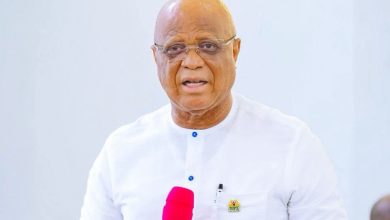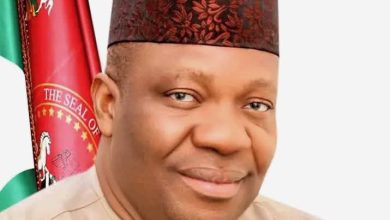
“The policy framework of this Budget is predicated on the developmental objectives and catalysts outlined in the State Medium Term Plan Document” Governor Udom Emmanuel
The above statement is a recurring line in all the presentations of budget proposals by Governor Udom Emmanuel to the Akwa Ibom State House of Assembly.
Yet, checks reveal that the State does not have such a document that guides its budget preparation.
Already, since May 2020, the call circular for the 2021 budget is already out and serious discussions are ongoing in Ministries, Departments and Agencies, MDAs over what will form the content of the 2021 budget proposal hence become ready on time for the State Governor to present in October to the Akwa Ibom State House of Assembly. But will the State Governor again present the budget without a Medium Term Expenditure Framework already in place?
The Federal Government of Nigeria currently runs Medium Term Expenditure Framework and Fiscal Strategy that covers 2019 through 2021. The MTEF of 2020 through 2022 is already in place. President Muhammadu Buhari had in June 2020 submitted the 2021-2023 Medium Term Expenditure Framework (MTEF) and Fiscal Strategy Paper (FSP) to the National Assembly.
Many States in Nigeria plan their budget with a recognized and publicly known Medium Term Expenditure Framework. Prominent among such States include Kaduna, Jigawa, Delta, Plateau and Ondo State among others.
Yet, what really is a Medium Term Plan or better put, what is a Medium Term Expenditure Framework (MTEF) and what are its functions?
Understanding MTEF
Financial experts posit that budgets are not prepared in a vacuum. A budget must have a foundation for which it is prepared hence they note that budgets are usually a product of planning.
According to the Tijah-Bolton Akpan, Executive Director of Policy Alert, a non-governmental organization working to promote social, economic and ecological justice in the Niger Delta, budget crystalizes the intentions of a government and those intentions are captured in a plan.
He explains that at the national, state and local level, the government makes this plan in form of a long and medium term plan. The Executive Director notes that this plan is captured in a scenario that will impact in the implementation of budget.
” It is like putting these plans in a kind of package that will form the basis for the implementation of budget year to year”, he delineates.
Thus, the MTEF is annual, rolling three year-expenditure planning. It sets out the medium-term expenditure priorities and hard budget constraints against which sector plans can be developed and refined. MTEF also contains outcome criteria for the purpose of performance monitoring. MTEF together with the annual Budget Framework Paper provides the basis for annual budget planning.
According to the World Bank’s Public Expenditure Management Handbook (1998), “The MTEF consists of a top-down resource envelope, a bottom-up estimation of the current and medium-term costs of existing policy and, ultimately, the matching of these costs with available resources… in the context of the annual budget process.”
The “top-down resource envelope” is fundamentally a macroeconomic model that indicates fiscal targets and estimates revenues and expenditures, including government financial obligations and high cost government-wide programmes such as civil service reform. To complement the macroeconomic model, the sectors engage in “bottom-up” reviews that begin by scrutinizing sector policies and activities (similar to the zero-based budgeting approach), with an eye toward optimizing intra-sectoral allocations.
Once the MTEF has been developed, it is rolling in the sense that the first outward year’s estimates become the basis for the subsequent year’s budget, once changes in economic conditions and policies are taken into account.
The Executive Director of Policy Alert explains further that MTEF looks at macro economic framework, looks at the economic context of the State, looks at the global environment and national economic environment such as oil prices, production volumes, inflation rate, then It plays around with this and project to see how those scenarios will impact the implementation of the budget each year.
He adds ” MTEF is the medium term picture while Budget is the short term picture. At every point in time, you should have a three (3) year scenario or plan that gives you a clear picture of how those budgets will be implemented. It is more like having a three year budget and implement it year 1, 2 and 3.”
When the framework is created, it is sent to the House of Assembly at least three months before the budget proposal comes in. This happens too at the National level where the MTEF is sent to the National Assembly awaiting the budget proposal. What really then is the function of the MTEF?
Importance of MTEF
The World Bank’s Public Expenditure Management Handbook notes that the MTEF is intended to facilitate a number of important outcomes: greater macroeconomic balance; improved inter- and intra-sectoral resource allocation; greater budgetary predictability for line ministries; and more efficient use of public monies. The handbook says improved macroeconomic balance, including fiscal discipline, is attained through good estimates of the available resource envelope, which are then used to make budgets that fit squarely within the envelope. MTEFs aim to improve inter- and intra-sectoral resource allocation by effectively prioritizing all expenditures (on the basis of the government’s socio-economic programme) and dedicating resources only to the most important ones.
A further objective of the MTEF is greater budgetary predictability, which is expected as a result of commitment to more credible sectoral budget ceilings. What is more, the handbook states that to the extent that budgetary decision making is more legitimate, greater political accountability for expenditure outcomes should also ensue. It says the MTEF also endeavors to make public expenditures more efficient and effective, essentially by allowing line ministries greater flexibility in managing their budgets in the context of hard budget constraints and agreed upon policies and programmes.
Interestingly, the MTEF captures a possibility of unforseen occurrences. The Policy Alert helmsman points out that Fiscal Risk Appendix in the MTEF captures the possible risk and where they could possibly come from.
He adds ” For example, as of the time of deliberation of the 2020 budget, there was no COVID 19 in Nigeria, but there was still COVID-19. Framers of the budget won’t be oblivious of the risk at the global level”.
Akpan mentions that the MTEF also guides the Government on how to handle projects which expenditure will span across years.
He states ” Take for instance in projects like road construction. You know contracting does not happen in a January to December calendar. Some contracts overlap. They roll over years. Some of the payments roll over into the next year. It is done in the budget of the next year. How do you cope with scenarios like that? It has to be captured in a three year plan”. Nevertheless, how would government get input for the MTEF?
Participatory Dimension of MTEF
The Government does not just sit down in their office to write the MTEF. Rather, it is developed in participatory manner.
The Executive Director of Policy Alert notes that stakeholders, community people, civil society groups, professional organisations among others are brought in to the room to weave together that document which will give direction.
Akpan mentions that his organisation, Policy Alert, often gets involved when MTEF is developed at the National level even work as consultant for some State government. He states “We have town hall meetings in Abuja, Lagos were stakeholders across the country including civil society groups are brought together to discuss and debate the MTEF. Various States of the Federation do this too”.
MTEF and the Akwa Ibom Situation
The Executive Director of Policy Alert notes that since over the years, the State does not have the MTEF or a perspective planning ( Long term), it is the reason the State budget have been underperforming. “Over the years, we have been budgeting without planning which means budgeting to fail”, he says.
Akpan explains that the reason for the underperformance stems from the fact that Akwa Ibom State budgets are not rooted in any concrete development plan or any concrete analysis of the economic scenarios surrounding the year to year implementation of the budget.
He insists that the vacuum currently speaks to the failure of oversight on the part of the Akwa Ibom State House of Assembly.
Akpan notes ” The Akwa Ibom State House of Assembly has not done sufficiently in demanding accountability from the Executive in that area. You receive a budget and you don’t ask anything about the MTEF? Nevertheless, to an extent, they can be excused that the MTEF was not mandatory. It was not rooted in law before now.”
Interestingly, however, when assent is given to the Fiscal Responsibility Bill recently passed into law by the Akwa Ibom State House of Assembly, it will be a crime for the State to consider a budget without Medium Term Expenditure Framework.
Akpan adds ” The Fiscal Responsibility law will make it an offence for the Governor to send a budget unaccompanied by MTEF. The faulty tradition of the budget going to AKHA without MTEF will be a thing of the past”.
Be that as it may, the Policy Alert Director assures that it is not too late for the State to have the MTEF. He recommends that the Akwa Ibom State Government can still hazard MTEF before the 2021 budget is presented to Assembly.
” It will be a huge mistake for us to put the Fiscal Responsibility law in place and still in October this year present a draft copy of the 2021 budget without an MTEF. It will be another mistake”, Akpan insists. Yet, does antecedents give indication that the State may be rightly disposed to embrace this fiscal reform to put in place the MTEF in preparation for her budgets?
AKSG and Fiscal Reforms
Akpan expresses optimism that the fiscal reforms embraced by the Akwa Ibom State Government in the last one year puts the State on the right pedestal to consider the MTEF.
He says Akwa Ibom state is not operating in isolation in terms of fiscal reforms hence in the past one year, the public have seen a lot of budget documents put online in the public domain.
He notes “These are things we never used to have. The Annual budget, Accountant General Report, Auditor General Report, Quarterly Budget Implementation Report , even some of the laws are online.
” Some people will say the progress is as a result of World Bank incentive. Yes, incentives do work. Governance Reforms Practitioners are excited. It is a very exciting learning curve for us. We are confirming that governance incentives actually works to trigger reforms.”
The Policy Alert boss says by putting in place the MTEF, the Akwa Ibom State Government may just place itself in a good position among top States in the country to benefit from the World Bank-assisted States Fiscal Transparency, Accountability and Sustainability (SFTAS) grant. The total sum of (N43,416,000,000.00) USD120.6 Million was so far disbursed to 24 qualified States based on their performance for the 2018 assessment year.
Kaduna State achieved the highest number of results (nine) and got the highest share with N3.960 billion.
Akwa Ibom State was among the 12 States that missed out on the 2018 grants having failed to meet the Eligibility Criteria.
Notwithstanding, more is expected from the reforms. Akpan points out: ” Now, what we want to see beyond that progress is feeling some of the gaps so that it doesn’t look like we are just trying to tick the boxes and fulfil all righteousness.
” It should be that we have the interest of the people at heart and the only way we can demonstrate that is to put our brains to work and plan for the people. The MTEF and fiscal strategy papers are very important in this regard”.




